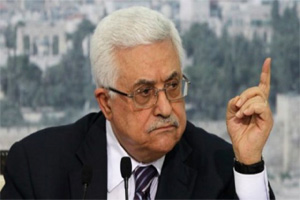 The Palestinian president Mahmoud Abbas, has warned in explicit terms that Israel will have to reassume responsibility for the Palestinian areas – including providing basic services for some 2.5 million people – if the US-sponsored peace talks finally collapse in a week’s time.
The Palestinian president Mahmoud Abbas, has warned in explicit terms that Israel will have to reassume responsibility for the Palestinian areas – including providing basic services for some 2.5 million people – if the US-sponsored peace talks finally collapse in a week’s time.
The warning came as Abbas set out his conditions to Israel for a nine-month extension to the peace negotiations, and as the first Palestinian Liberation Organisation delegation to visit Gaza since 2007 arrived for unity talks with their Islamist rivals Hamas, who govern the coastal strip.
Abbas’s comments follow reports at the weekend that he was considering dismantling the Palestinian Authority if talks ended by the 29 April deadline without an extension.
That prompted US State Department spokeswoman Jen Psaki to warn that move would have “grave implications” for US relations with the Palestinian Authority, including financial support.
With only days until the deadline expires for the end of the current round of deadlocked US-sponsored talks, Abbas laid out in graphic detail of the consequences of failure of the talks.
In what appeared to be a two-pronged strategy, Abbas suggested to visiting Israeli journalists in Ramallah that the deadline for talks with Israel could be extended if Israel agreed to spend the first three months of the new negotiating period discussing final border arrangements, freeze settlement construction on the West Bank and release a final group of long term prisoners.
The cancellation of that last prisoner release – agreed by Israel at the beginning of the latest round of talks – plunged the peace process into crisis last month.
“If Israel believes in the two state solution,” Abbas said, “let us define the borders – where Israel will be and where Palestine will be.”
At the same time Abbas warned of the consequences of the talks finally collapsing including financial and security responsibility.
“[Israel] will bear responsibility for security, meaning Israel will bear full responsibility … We hope that we won’t come to this period but that we come to solutions,” he added.
Abbas’s warning of the consequences of the talks’ collapse on 29 April came as a delegation from the PLO arrived in Gaza for unity talks with Hamas, the Islamist movement that has governed the coastal strip since 2007.
Although Azzam al-Ahmad, a senior Fatah official leading the group, denied that the first PLO delegation to visit Gaza since 2007 was a move designed to strengthen Abbas’s hand in the negotiations with Israel, the timing of the two events was striking.
“We want to end the division whether there is negotiation [with Israel] or there isn’t. We want to build Gaza and the West Bank and end the [Israeli] occupation,” Ahmad told the official Palestinian news agency Wafa.
Abbas’s message appeared to be underlined by a series of speeches by both Hamas’s prime minister Ismail Haniyeh and Ahmad, who raised the prospect of talks to bring Hamas under the umbrella of the PLO. “We must conclude national reconciliation and end the division so we can have one government, one political national agenda and one system … There is no room for failure at this dialogue,” Haniyeh told a packed meeting of officials adding his movement was “open for unity” and welcomed its Fatah partners.
Overtures by Abbas and the PLO to heal toxic rivalry with Hamas has emerged in parallel with the Palestinian unilateral application to join UN and other international treaties and institutions as an alternative track to the faltering peace talks with Israel.
In response to the talks with Hamas, an unnamed senior Israeli politician – quoted by the Israeli news website Ynet – said: “Behind the empty statements on peace, [Abbas] is holding unity talks with Hamas, which around the world is considered a terror organization bent on destroying Israel and killing Jews.”
Unity talks between the two main Palestinian factions have failed to make progress since both sides failed to implement an Egyptian-brokered agreement in 2011 because of disputes over power-sharing and the handling of conflict with Israel.
The Guardian

Leave a Reply
You must be logged in to post a comment.